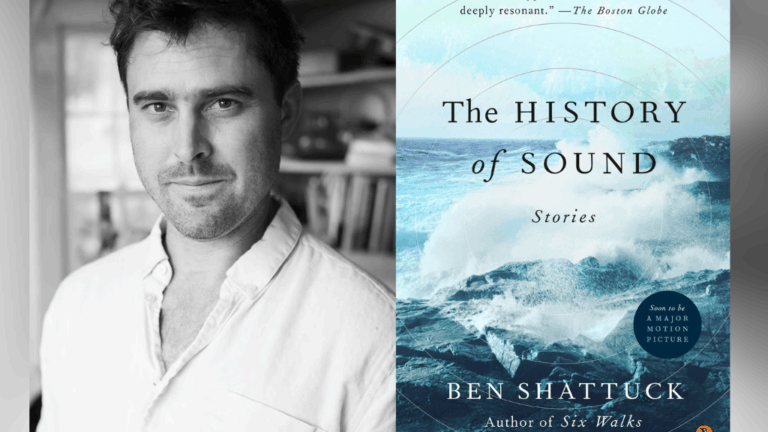As Ben Shattuck’s “The History of Sound” graces theaters, the Massachusetts author shares plans for more films, including an exciting project directed by Ben Stiller. Shattuck, a multifaceted talent known for his contributions as a painter, writer, and general store owner, likens his creative journey to navigating a river, where each opportunity is a new tributary.
Reflecting on his diverse career, Shattuck has ventured through various artistic realms. From founding the Cuttyhunk Island Writers’ Residency to publishing nonfiction such as “Six Walks,” which traces the footsteps of Henry David Thoreau, Shattuck’s creative evolution continues to surprise. Recently, he shifted focus to short fiction with his latest work, “The History of Sound,” while also delving into screenplay writing, including a World War II film with Ben Stiller attached as director and Jeremy Allen White set to star.
At 41, Shattuck articulates his artistic philosophy: “You might think the creative life is like hiking a mountain, trying to get from one summit to the next. But it’s actually more river-like. You find an opportunity, take that tributary.”
Currently, he resides in Brooklyn with his wife, actress and writer Jenny Slate, and their four-year-old daughter, Ida. However, summers are spent in South Dartmouth, where his roots lie. Shattuck’s connection to nature resonates through his work, with landscapes of New England—Cape Cod’s windswept beaches, the rugged Maine coastline, and Massachusetts salt marshes—serving as a backdrop in both his fiction and nonfiction.
The book’s twelve stories explore these themes, with the titular tale adapted into a film by director Oliver Hermanus. The movie features Paul Mescal as Lionel, Josh O’Connor as David, and Chris Cooper as an older version of Lionel. Set against the backdrop of New England during World War I, the narrative follows two Boston Conservatory students as they fall in love while recording old folk tunes, preserving the essence of human culture on phonograph tubes.
Upon its debut at the Cannes Film Festival, the film has since launched into select theaters, marking Shattuck’s promising entry into screenwriting. Oscar winner Chris Cooper, known for being selective with scripts, expressed enthusiasm about his involvement, stating, “Oh, my God. I— are you familiar with Ben Shattuck’s writings? I absolutely love his writing.” Cooper added, “This is what I live for.”
Recognized by Variety as one of the “Screenwriters to Watch for 2025,” Shattuck has yet to take a formal screenwriting class, yet he was approached by Stiller to adapt the novel “The Lost Airman: A True Story of Escape From Nazi-Occupied France,” a poignant World War II drama featuring Jeremy Allen White. In the meantime, his short story collection is on the shortlist for the 2025 Mark Twain American Voice in Literature Award.
“The History of Sound” serves as a tribute to the natural world and the rich tapestry of human experiences and culture, intertwined with the suspenseful elements of a mystery. Shattuck ingeniously pairs each tale, with the first establishing a mystery followed by its resolution in the subsequent story. Objects such as paintings and a cult leader’s Bible reappear, linking the narratives and illustrating how the past shapes the present.
For instance, in “August in the Forest,” a trio in present-day New Hampshire investigates a chilling mass murder from the early 1900s. In the following story, “The Journal of Thomas Thurber,” readers explore the harrowing diary of a logger explaining the tragic events that unfolded.
“In a short story collection, each story is its own little universe,” Shattuck notes. “So when something from one story is introduced in another, you get this magical feeling.” His narrative approach is reminiscent of Daniel Mason’s acclaimed novel “North Woods,” yet Shattuck’s work holds a distinct identity.
Having read the collection multiple times, I found it an entrancing escape into historical fiction. The stories span from the late 1600s to the early 1900s, offering a lengthy diversion from modern distractions. Characters are often depicted engaging in timeless activities—drawing with charcoal, planting gardens, and preparing meals—infusing the narratives with a sense of nostalgia and evoking the essence of New England life.
Shattuck shares, “I’ve heard from a lot of people who moved away from New England saying it felt nostalgic for them, reminding them of what it feels like to be here.” He emphasizes that the New England landscape and its harsh winters profoundly shape its inhabitants, influencing their character arcs.
For those who appreciate audiobooks, the narration of the titular story by Cooper alongside a talented cast—including Mescal, Ed Helms, Nick Offerman, and Slate—enhances the experience.
Currently, Shattuck is busy with various projects, including adapting another story, “Graft,” for film. He prepares for the UK premiere of “History” in London on October 18, while the book continues to garner international attention, with translations in French, Italian, Portuguese, Ukrainian, and German.
In a recent interview, I inquired about the book’s release coinciding with the film’s premiere. Shattuck reflected, “I wrote the short story ‘The History of Sound’ over 10 years ago, at the Iowa Writers Workshop. After that, I was painting and writing nonfiction. Then it was published by Common Magazine and later won a Pushcart Prize in 2019, helping it reach a wider audience. A producer discovered it and saw potential for a film.”
Discussing the inspiration behind his paired story-telling technique, Shattuck mentions the principle shared in Chekhov’s gun: once an object is introduced, it should reappear. This motif serves as a vehicle for connecting the stories and presents a thoughtful narrative structure.
When creating historical fiction, Shattuck aims to provide context for the characters, highlighting connections between the past and present. He cites Edison’s wax cylinders as a poignant narrative device, intertwining time and identity with the notion of messages transcending eras.
As his work continues to evolve, Shattuck is committed to exploring themes that resonate deeply with audiences: the timeless nature of human experiences, the complexities of connections, and the layered richness of history. His reflections on the past offer a unique lens into the human condition, making his contributions to literature and film all the more impactful.






